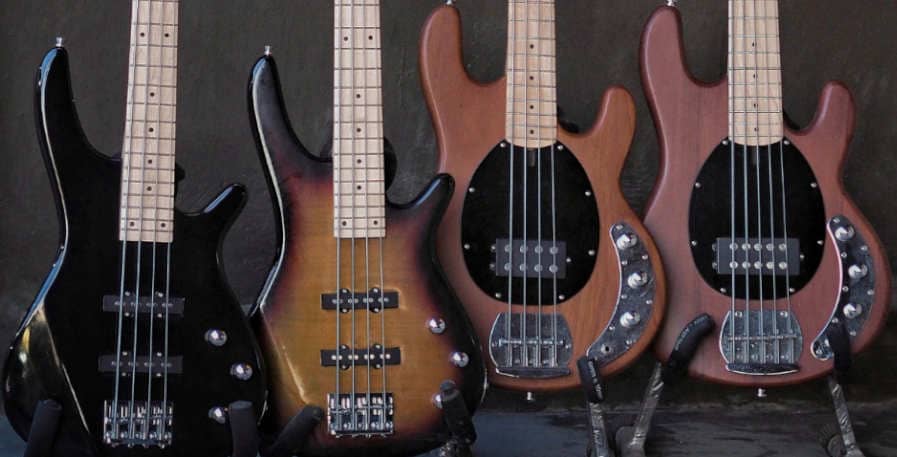Storing your bass guitar safely is not as hard as some bassists make it out to be. However, it is important that you go about it correctly to preserve the condition of your instrument.
It can seem unimportant, as bassists often don`t put a lot of thought into how they store their instruments. Unfortunately, there is also a handful of people that can tell you horror stories of what happened to their basses as a result of storing them incorrectly.
Therefore, I wrote this guide to ensure that you avoid this nightmare scenario.
I will show you how to store your bass if you just need to put it away for a couple of days. Then, I will show you how this differs from long-term storage, and what additional steps you need to take if you’re not going to play your instrument for a while.
How do you store a bass guitar short term?
When stored for short periods of time, a bass guitar should be kept inside its gig bag, on a stand, or on a wall-hanger. The instrument should not be stored directly in front of windows in order to avoid direct exposure to sunlight.
Storing your bass in a bag or a case is superior to storing it on a stand or hanging it on the wall. This will provide better protection from accidental damage, as well as from sunlight and humidity.
With that said, you can generally store your bass on a stand or wall hanger in your room without issue.
Stands only become an issue if the sun shines directly at the bass through the window at some point during the day. If exposed long enough to direct sunlight the finish of the bass can start cracking. Acoustic basses, in particular, can quickly break as a result of this.
Another possible cause of damage is humidity. However, as long the bass is kept at around room temperature and the humidity remains relatively stable, this will not be harmful to the bass in the short term.
A stand is thus fine for short-term storage for the vast majority of bassists. Music stores display and store their basses this way all the time without this causing damage to their instruments.
The same goes for wall hangers. I`ve heard guitarists and bassits claim that this puts unwanted strain on the instrument, but this is not the case.
Hung on the wall, the pull of the strings towards the headstock will balance out the weight of the instrument. This puts the bass in a state where its weight is balanced out and is thus a perfectly safe method for maintaing the condition of your bass.

How do you store a bass guitar long-term?
When stored long-term, a bass guitar should be kept in a case or a gig bag. It should be kept away from direct sunlight, changes in humidity, and out of reach of children and animals. Storing the bass at a vertical angle avoids putting needed strain and pressure on the instrument.
Wood is elastic enough so that small and gradual changes in dampness and temperature will not noticeably impact a bass. This becomes an issue if these changes happen fast, or if the temperature reaches excessively hot or cold or points.
For most bassists, this will not be a major issue. However, bassists living in humid climates should be mindful of this. The same holds true if there are big fluctuations in temperature throughout the year.
Ideally, the air humidity should be at around 50%. The bass should be kept at around room temperature, which is 68-72°F (20-22celcius). While slight deviations from these numbers are insignificant, big changes in either temperature or humidity could be harmful to your bass.
Big changes in humidity can cause the wooden parts of your bass to start swelling or shrinking. This can be particularly damaging to the neck of the bass, and will in extreme cases make it unplayable.
If you cannot guarantee that the bass will not be stored in a stable environment, it can be beneficial to slightly detune the bass. There is however not any need for this if the bass is stored at a stable humidity and temperature.
I`ve stored basses for extended periods for over a decade now, and have never experienced any issues despite not detuning. Thus, it`s preferable to only detune if you cannot guarantee that it will stay at a stable temperature and humidity.
If you do not have a bag for your bass, I do recommend getting one if you are going to store it for more than 2 weeks at a time. I also recommend storing it inside a closet if it would otherwise be in the reach of animals or children.
While a case offers better protection, bags work fine for long-term storage and are generally more affordable. It is preferable to have a gig bag with sufficient padding, as this will add a further layer of protection to your instrument.
How do you store a bass without a case?
As a general rule, a bass guitar without a case should be stored vertically in a closet, or a similar storing space. This way the instrument won`t be exposed to direct sunlight or humidity and temperature changes, which helps preserve its condition.
While a gig bag does provide better protection for your instrument, it is possible to store it without one.
Ideally, you want to store the bass standing up, to prevent dust from easily accumulating on it. If you have to store it on its back, it`s a best practice to cover it with a sheet to prevent this from happening. Never store the bass with the strings facing down.
Depending on the climate and house, it is generally preferable to choose a closet that doesn`t face an outer wall. This will further ensure that it is not exposed to humidity and temperature changes. For the same reasons, I also advise against storing the bass in a car, garage, or shed.
Conclusion
As we have learned, storing your bass correctly is as easy as it is important.
Unless a room is excessively dry or damp, storing a bass in it should not be an issue. Slight and gradual shifts in humidity are rarely an issue. This is because the wood of the bass can adjust to its environment to some extent.
For bassists that live in a climate with big fluctuations in humidity throughout the year, an air humidifier can be beneficial for preserving the condition of your instrument.
It`s also worth noting that acoustic basses are more prone than electric ones. Thus, it is a best practice to keep them in bags, or at the very least make sure the sun never shines directly at them.
Thus, if you follow these steps, your precious instruments are highly unlikely to ever suffer any damage while being stored.

